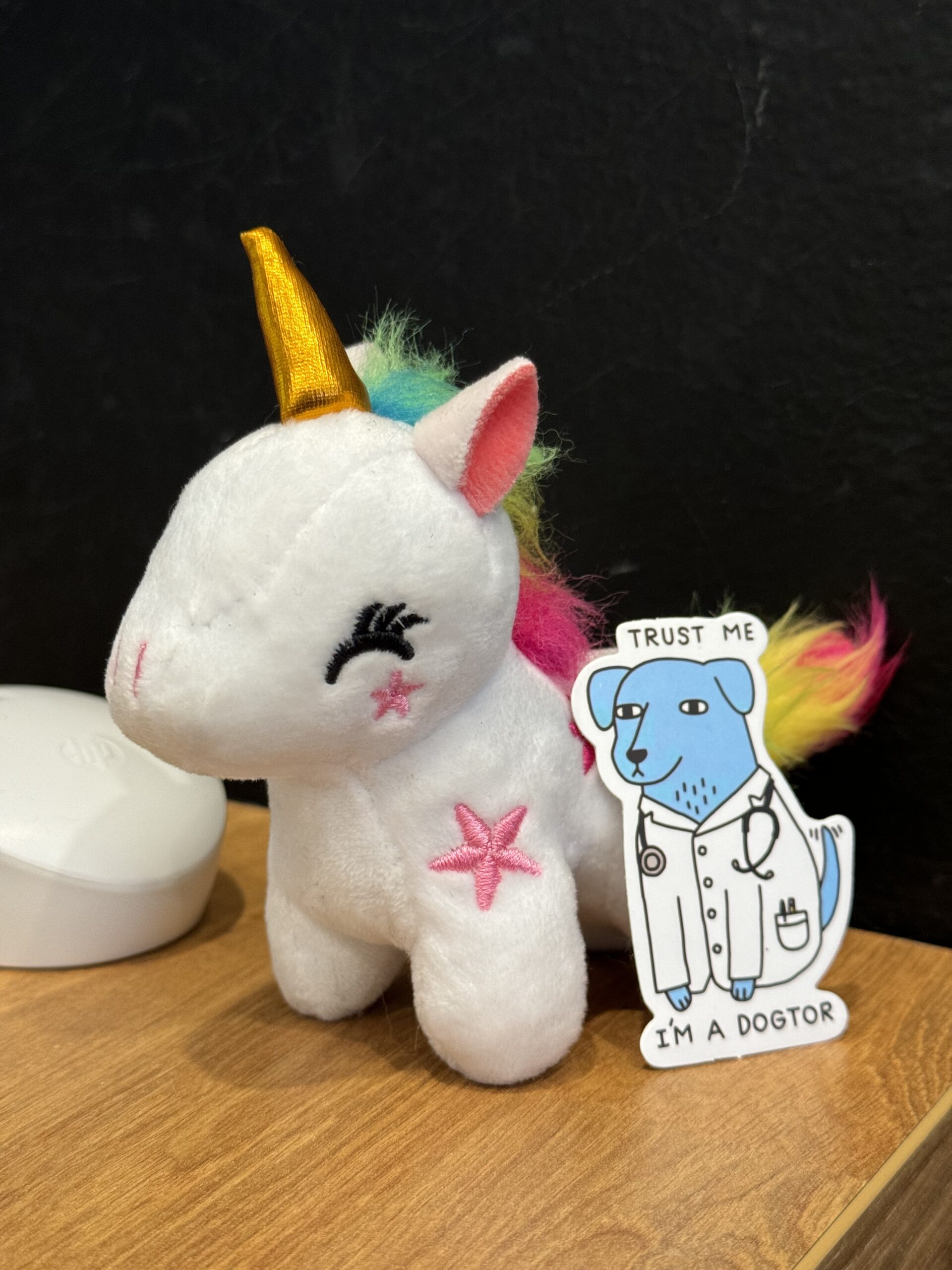Hey there, wonderful pet parents!
About 2 weeks back, we had a bit of a tech hiccup at the clinic. Our texting system, which is usually buzzing with your messages, suddenly went quiet 📵. Turns out, it was mistakenly flagged due to our chats about CBD – funny, right? Well, after a few earnest (!) talks with our software company, we’re back online, and you might notice we’re spelling “C B D” with the spacing to keep things smooth. 😅
This experience was a real eye-opener for me. It highlighted how sometimes the world needs to catch up with the advancements in innovative integrative therapy. While CBD has a wealth of proven science and therapeutic effects behind it, it’s intriguing (and a bit amusing / frustrating) to see it still grappling with stigma. This year, more than ever, our team is committed to education and spreading awareness about the science underpinning integrative therapies. Knowledge is power, and understanding the science behind these therapies is crucial in our journey toward holistic pet wellness. 📘🔬
Speaking of evolving perceptions, there’s been quite the chatter about certain pet foods potentially causing tummy issues. While the link isn’t crystal clear yet, it’s something we’re keeping a close eye on. Nutrition is a complex world, and staying informed is key. 🥘🔬
I wanted to take a moment to dive a bit deeper into the importance of nutrition and the role of science-backed knowledge in ensuring the well-being of our furry family members. As we experienced with our recent tech hiccup, sometimes the world is still catching up with the latest in integrative pet care, like the benefits of CBD. Just as we navigated that challenge, we continually strive to stay at the forefront of veterinary science, especially when it comes to nutrition. 🌿🔬
You see, pet nutrition isn’t just about filling their bellies. It’s a crucial component of their overall health and can significantly impact their quality of life. This is where the science of the microbiome comes in. The microbiome refers to the vast community of microorganisms living in the digestive system. It plays a vital role in digestion, immunity, and even affects mood and behavior. A balanced, diverse microbiome is key to a healthy, happy pet. 🦠💚
When we stick to feeding our pets the same food day in and day out, we might inadvertently limit the diversity of this microbiome. Just like in humans, a varied diet in pets can lead to a more robust and resilient gut flora. This diversity not only aids digestion but also strengthens their immune system, making them better equipped to fight off illnesses and infections. 🍽️🐶
Each pet is an individual with unique dietary needs that can vary based on age, health conditions, breed, constitution, energetics, and their lifestyle and environment. This is why a one-size-fits-all approach to pet food often falls short. By understanding the science behind pet nutrition and the microbiome, we can make more informed choices about what we feed our pets. 🧐📊
If you’re exploring pet food options, I recommend starting with the well-researched list available here. It’s a great resource to guide you in making scientifically informed decisions about your pet’s diet. (There is a small fee to support Susan Thixton who owns the site).
You can also scroll down to our weekly Starlight story where she is giving a free handout on the energetics of food ingredients! ⭐️
Moreover, my colleague Dr. Janet Roark is doing an Animal Nutrition Workshop:
This 1-hour workshop will cover:
✔️The basics of nutrition for all species
✔️Daily recommendations and examples for any budget
✔️Incorporating essential oils and supplements
✔️A downloadable list of food recommendations for pets
✔️Homemade options
✔️ Live Q & A at the end to get your questions answered
Mark your calendar for Wednesday, January 31st at 5PM PacificTime | 8PM Eastern Time. Click on this link to learn more and sign up!
Navigating pet nutrition can be complex, and our team can help. If you have any concerns or questions about your pet’s diet or would like to know more about creating a diverse and healthy meal plan, please don’t hesitate to reach out. Let’s work together to ensure your pet’s diet supports a thriving microbiome and overall health. 🌟🐱
Remember, good nutrition is the foundation of good health, and it’s our mission to provide your pets with the best care possible. 🩷
With warmth and care,
Dr. Lily Chen 💌🐕🐈
Starlight Stories
Dear Unicorns, 🦄
In the realm of nutrition and health, both for humans and pets, the concept of body and food temperature holds significant importance. Our bodies operate within a narrow temperature range, maintaining a delicate balance known as homeostasis, which is essential for optimal physiological functioning. The temperature of the food we consume plays a crucial role in this balance. For instance, consuming foods at extreme temperatures can impact digestion – cold foods might slow down the digestive process, requiring the body to expend more energy to warm it up, while very hot foods can cause discomfort. In the context of pet nutrition, this understanding is pivotal. Traditional Chinese Veterinary Nutrition (TCVN) takes it a step further by emphasizing the ‘energetic temperature’ of food, aiming to balance a pet’s internal yin and yang energies. This approach suggests that aligning the temperature of the food with the pet’s individual health needs can lead to improved digestion, better nutrient absorption, and overall well-being. Therefore, considering the temperature aspect in dietary choices can be a subtle yet impactful way to enhance the health and happiness of our pets.
Check out our Food Therapy guide to help you select the right ingredients!
Starlight ⭐


